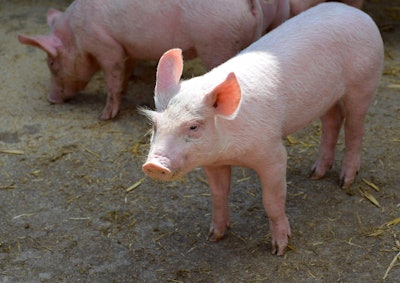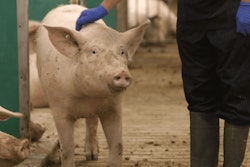
One large commercial farm in Estonia hit by African swine fever (ASF) has announced the impending loss of one-quarter of its workforce.
The collective layoff process by Maag Agro has already started, reported the national news agency ERR.
Already affected are 44 workers at the company’s Ekseko Farm, as it continues procedures to eliminate the virus.
As of last week, it was uncertain when pig production would resume at the site — if ever — and whether further job losses would be necessary.
This was because the state authorities have yet to announce any measures to support the sector, according to a member of the firm’s management board.
“We’re waiting to see what compensation for the eradication of the disease and other measures will look like,” he said. “At the moment, everything is still up in the air.”
One dead pig tested positive for the ASF virus after showing typical symptoms at the farm on August 26. According to the official notification to the World Organisation for Animal Health (WOAH) at that time, it was one of around 28,000 animals at one of the two units at the farm with a total herd of around 50,000 pigs.
So far, 11 Estonian farms have been hit by ASF since February, directly impacting more than 56,000 domestic swine, as well as 140 wild boar.
Most recently reported to WOAH was an outbreak at a smaller premises in mid-September. It was the first to be confirmed in the eastern county of Jõgeva, which is a key area for the nation’s pig farming.
Recent ASF outbreaks in farmed pigs of 4 European countries
In the period September 18-24, three of the region’s states logged a total of 31 additional ASF outbreaks in domestic animals. This is according to the latest update of the Animal Disease Information System from the European Commission (EC). Through this database, the EC monitors outbreaks of listed animal diseases in European Union member states and selected adjacent countries.
Serbia registered 19 further outbreaks in this population with the EC over the past week, Croatia 11, and Bosnia-Herzegovina one.
More detail on developments are covered in notifications from the national animal health agencies to WOAH.
Of three additional outbreaks registered in Croatia, one affected a farm with more than 9,800 swine. It and two much smaller herds hit by ASF earlier this month are located in Osijek-Baranja. Several previous outbreaks have occurred in this northeastern county in recent months.
Latest outbreak in Bosnia-Herzegovina involved a backyard herd of 10 swine, according to the WOAH report. It occurred in the east of the country, in the Republic of Srpska.
Furthermore, Romania’s veterinary agency has confirmed a further 24 ASF outbreaks to the same organization.
Starting in the period September 16-24, these affected a commercial premises with around 5,600 animals in the northwest of the country, and 23 backyard herds. Each of these comprised between one to 26 pigs, and were distributed across eight counties.
To date in 2025, a total of 681 outbreaks in domestic pigs have been registered with the EC System by 13 countries. Highest total so far is 346 for Romania, followed by Serbia (158).
For comparison, 16 countries recorded a total of 764 outbreaks in this category with the database.
New ASF outbreaks in wild boar in 9 countries
During the past week, new cases of ASF in their respective wild boar populations were reported to the EC by Croatia, Estonia, Germany, Hungary, Italy, Latvia, Lithuania and Poland.
Furthermore, WOAH was notified that two more animals have tested positive for the virus in Bosnia-Herzegovina.
So far this year, a total of 8,217 outbreaks of the disease have been registered with the System by 18 countries in the region (as of September 24).
At 2,774, Poland has confirmed the most cases among its wild boar. Next come Germany (1,839 outbreaks to date this year), Latvia (891), Hungary (694), Lithuania (542), and Italy (538).
Following more than 12 months without further cases being detected, the Czech Republic’s state veterinary service has announced the successful eradication of ASF from the country for the second time. This means that the country is now free of disease-related restrictions.
In Germany, ASF-related controls are being eased in one district in each of two eastern states following a period without the detection of new cases in wild boar.
This applies to the Bautzen district in Saxony, and to Spree-Neisse in Brandenburg, according to the respective state administrations.
However, a “protection corridor” will remain in place in both districts along the border with Poland. So, while most of the restrictions will be lifted for pig farmers and hunters elsewhere in those districts, wild boar found dead in the “corridor” will be sought out and tested for ASF.
ASF developments in Africa
Outside South Africa’s ASF control zone, domestic swine have tested positive for the virus at three more locations.
According to the latest WOAH report, one herd was affected in each of Free State, North West, and Gauteng in the period August 21-24. Affected were herds comprising between 25 and 200 pigs.
These bring to 222 the number of ASF outbreaks reported in these areas of South Africa since April of 2019.
Meanwhile, a second outbreak has been confirmed in the Cape Aghulas district of Western Cape, according to the local municipality.
On September 22, the authority reported the mortality of 31 of the 292 pigs at an encampment in Napier.
A previous outbreak in a similar herd at Bredasdorp in this area has now resulted in the death of 1,027 pigs since July. Only two animals were still alive there.
Both herds remain under strict veterinary supervision.
Veterinary authorities in the Republic of Madagascar have recently submitted to WOAH a six-month animal disease covering the first half of 2025.
It refers to 230 ASF outbreaks affecting the East African state’s domestic pigs over this period. Directly impacted were around 3,600 animals, of which more than 2,300 died.
New ASF cases in 3 Indian states
The latest area to be put under ASF restrictions in the northeastern state of Assam is Karbi Anglong.
A village there was declared a disease epicenter last week, reported Sentinel Assam last week.
Within a 1-km radius, all movements of live pigs and pork products have been halted. Increased monitoring and surveillance are being applied to swine within the next 10km.
Also in the northeast of India is Mizoram state, where a wild boar has tested positive for the ASF virus.
In recent days, Hindustan Times has reported that the infected animal was found dead near to the border with Assam in the Kolasib district. As a precaution, pork sales have been banned throughout the district.
Following the recent detection of ASF virus in the Ajnala district, a second area has been placed under restrictions in the northwestern state of Punjab. This followed positive ASF tests on swine at a village in Shaheed Bhagat Singh Nagar district, reported Babushahi.
At a recent event in Canada, several involved parties outlined the processes required to draw up an action plan ahead of a possible future disease outbreak.
View our continuing coverage of the global African swine fever situation.
















